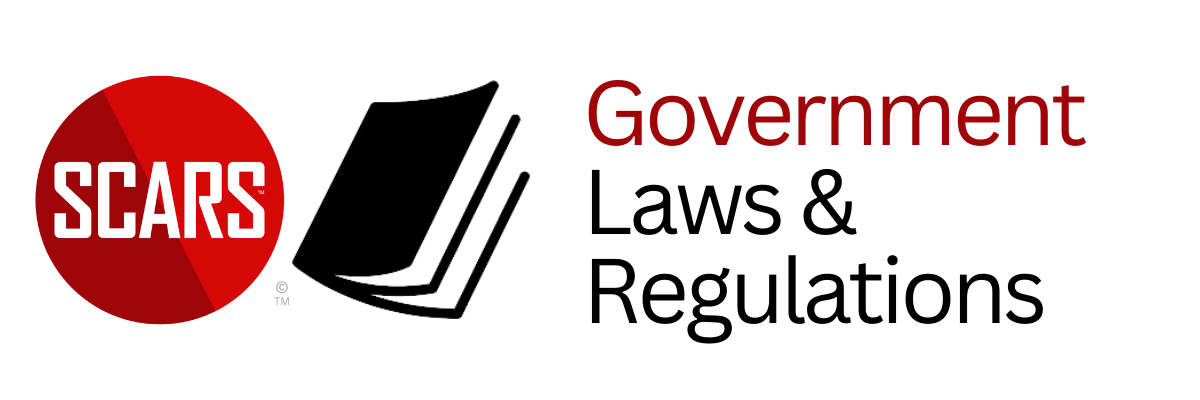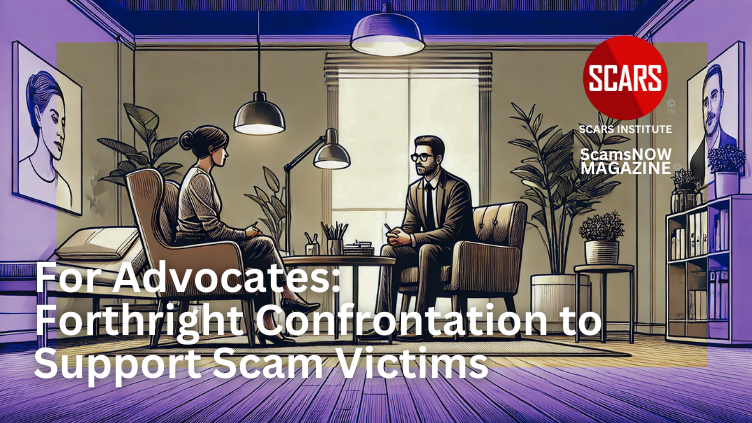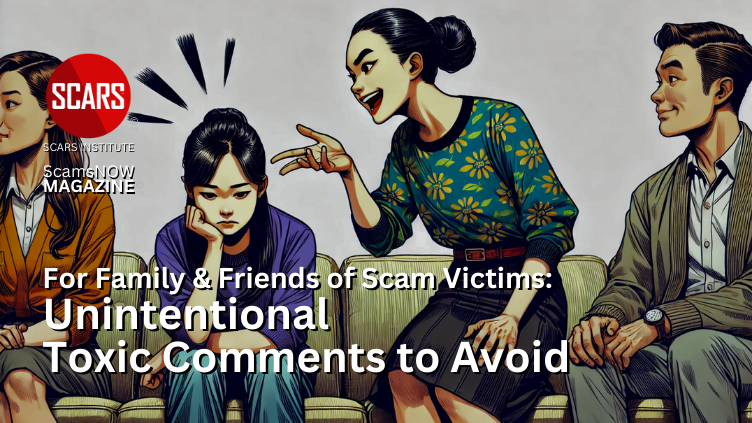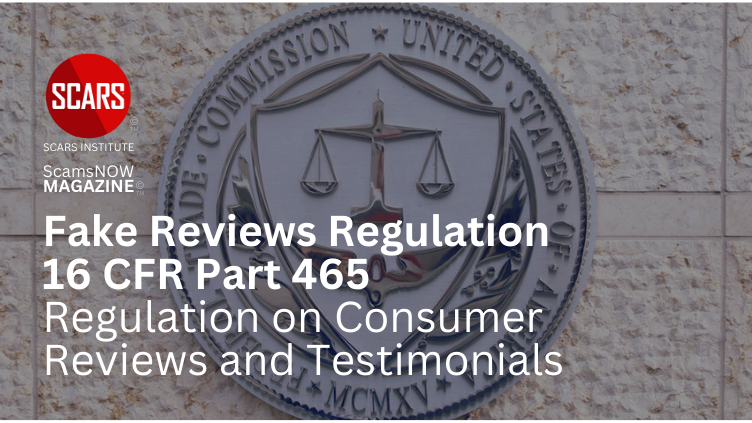FTC’s New Regulation Against Fake Reviews Take Effect
United States Federal Trade Commission Announces Final Rule Banning Fake Reviews and Testimonials
Primary Category: Government Regulation
Author:
• SCARS Editorial Team – Society of Citizens Against Relationship Scams Inc.
• Portions by the United States Federal Trade Commission
• Analysis by Tim McGuinness, Ph.D. – Anthropologist, Scientist, Director of the Society of Citizens Against Relationship Scams Inc.
About This Article
The Federal Trade Commission (FTC) has introduced a final rule to combat fake reviews and deceptive testimonials, marking a significant move to safeguard consumers from misleading practices. This rule explicitly prohibits the sale or purchase of false reviews, AI-generated reviews, and testimonials that misrepresent real customer experiences.
Businesses are banned from buying or incentivizing reviews with specific sentiments, and the rule also targets insider reviews by company employees or affiliates, requiring clear disclosure.
Additionally, the FTC is addressing the suppression of negative reviews through intimidation and the misuse of fake social media indicators, such as buying followers or views.
This new rule strengthens the FTC’s ability to seek civil penalties and hold businesses accountable, promoting fairness and transparency in the marketplace.

United States Federal Trade Commission Announces its Final Rule Banning Fake Reviews and Testimonials
The rule will allow the Federal Trade Commission to strengthen enforcement, seek civil penalties against violators, and deter AI-generated fake reviews
Federal Trade Commission Announces
The Federal Trade Commission today announced a final rule that will combat fake reviews and testimonials by prohibiting their sale or purchase and allow the agency to seek civil penalties against knowing violators.
“Fake reviews not only waste people’s time and money but also pollute the marketplace and divert business away from honest competitors,” said FTC Chair Lina M. Khan. “By strengthening the FTC’s toolkit to fight deceptive advertising, the final rule will protect Americans from getting cheated, put businesses that unlawfully game the system on notice, and promote markets that are fair, honest, and competitive.”
The final rule announced today follows an advance notice of proposed rulemaking and a notice of proposed rulemaking announced in November 2022 and June 2023, respectively. The FTC also held an informal hearing on the proposed rule in February 2024. In response to public comments, the Commission made numerous clarifications and adjustments to its previous proposal.
The Final Rule Prohibits
- Fake or False Consumer Reviews, Consumer Testimonials, and Celebrity Testimonials: The final rule addresses reviews and testimonials that misrepresent that they are by someone who does not exist, such as AI-generated fake reviews, or who did not have actual experience with the business or its products or services, or that misrepresent the experience of the person giving it. It prohibits businesses from creating or selling such reviews or testimonials. It also prohibits them from buying such reviews, procuring them from company insiders, or disseminating such testimonials, when the business knew or should have known that the reviews or testimonials were fake or false.
- Buying Positive or Negative Reviews: The final rule prohibits businesses from providing compensation or other incentives conditioned on the writing of consumer reviews expressing a particular sentiment, either positive or negative. It clarifies that the conditional nature of the offer of compensation or incentive may be expressly or implicitly conveyed.
- Insider Reviews and Consumer Testimonials: The final rule prohibits certain reviews and testimonials written by company insiders that fail to clearly and conspicuously disclose the giver’s material connection to the business. It prohibits such reviews and testimonials given by officers or managers. It also prohibits a business from disseminating such a testimonial that the business should have known was by an officer, manager, employee, or agent. Finally, it imposes requirements when officers or managers solicit consumer reviews from their own immediate relatives or from employees or agents – or when they tell employees or agents to solicit reviews from relatives and such solicitations result in reviews by immediate relatives of the employees or agents.
- Company-Controlled Review Websites: The final rule prohibits a business from misrepresenting that a website or entity it controls provides independent reviews or opinions about a category of products or services that includes its own products or services.
- Review Suppression: The final rule prohibits a business from using unfounded or groundless legal threats, physical threats, intimidation, or certain false public accusations to prevent or remove a negative consumer review. The final rule also bars a business from misrepresenting that the reviews on a review portion of its website represent all or most of the reviews submitted when reviews have been suppressed based upon their ratings or negative sentiment.
- Misuse of Fake Social Media Indicators: The final rule prohibits anyone from selling or buying fake indicators of social media influence, such as followers or views generated by a bot or hijacked account. This prohibition is limited to situations in which the buyer knew or should have known that the indicators were fake and misrepresent the buyer’s influence or importance for a commercial purpose.
As the Commission noted previously, case-by-case enforcement without civil penalty authority might not be enough to deter clearly deceptive review and testimonial practices. The Supreme Court’s decision in AMG Capital Management LLC v. FTC has hindered the FTC’s ability to seek monetary relief for consumers under the FTC Act. This rule will enhance deterrence and strengthen FTC enforcement actions.
The Commission vote to approve the final rule and accompanying statement of basis and purpose was 5-0. The rule will become effective 60 days after the date it’s published in the Federal Register.
The primary staff members on this matter are Michael Ostheimer and Michael Atleson in the FTC’s Bureau of Consumer Protection.
SCARS Institute Analysis of the FTC’s Final Rule Banning Fake Reviews and Testimonials: Impact on Consumers and Businesses
Analysis by the SCARS Institute Think Tank, Tim McGuinness Ph.D., Director
The Federal Trade Commission’s (FTC) final rule banning fake reviews and testimonials is a crucial regulatory step that strengthens consumer protection and increases the accountability of businesses in their marketing and advertising practices. This regulation is aimed at curbing deceptive practices that mislead consumers into making purchasing decisions based on false or misleading information. Below is an analysis of what this rule entails, and its specific impact on both consumers and businesses.
Key Aspects of the FTC’s Final Rule
The FTC’s final rule outlines a series of prohibited practices and establishes clear guidelines on what constitutes deceptive advertising in the context of reviews and testimonials. The rule applies to several areas, including:
Fake or False Consumer Reviews and Testimonials: The rule prohibits businesses from creating or promoting fake reviews or testimonials by individuals who do not exist, who have not used the product or service, or who misrepresent their experience.
Buying and Selling Reviews: The rule bars businesses from buying positive reviews or offering incentives to customers in exchange for reviews that express a particular sentiment.
Insider Reviews and Undisclosed Relationships: Reviews written by employees, insiders, or family members of the business must be disclosed transparently, and businesses are prohibited from disseminating reviews that fail to clearly and conspicuously disclose the reviewer’s connection to the company.
Suppression of Negative Reviews: Businesses are prohibited from using legal threats, intimidation, or false accusations to suppress negative reviews. Additionally, they cannot misrepresent their review platforms by selectively displaying only positive reviews while hiding negative feedback.
Fake Social Media Influence Indicators: The rule bans the buying and selling of fake social media metrics, such as followers or views generated by bots, when used to inflate a business’s perceived popularity or influence for commercial purposes.
The FTC now has the authority to impose civil penalties on businesses that knowingly violate these rules, which serves as a stronger deterrent against deceptive marketing practices than case-by-case enforcement alone.
Impact on Consumers
The primary beneficiaries of the FTC’s final rule are consumers, who stand to gain a more transparent and trustworthy marketplace. Here’s how the rule impacts them:
Improved Trust in Online Reviews: Consumers often rely on reviews and testimonials when making purchasing decisions, especially when shopping online. By eliminating fake reviews, the rule ensures that consumers can trust that the feedback they read is based on genuine experiences. This reduces the likelihood of consumers being misled by false information.
Fairer Competition in the Marketplace: Honest businesses that rely on authentic reviews and genuine customer feedback will no longer be at a disadvantage. By eliminating fake reviews and testimonials, the rule creates a level playing field, which promotes fair competition among businesses.
Protection from Deceptive Practices: The rule protects consumers from falling victim to companies that try to manipulate their decisions through fraudulent testimonials or fabricated social media popularity. Consumers are also safeguarded from businesses that suppress negative reviews, which can distort the perception of a product or service’s quality.
Transparency in Marketing: The requirement for businesses to disclose insider relationships in reviews ensures that consumers are not misled by biased or self-serving testimonials. This transparency allows consumers to make more informed decisions, knowing when reviews are influenced by a material connection to the business.
Impact on Businesses
For businesses, the new rule introduces several significant changes that may require adjustments in how they handle customer feedback, reviews, and marketing strategies. While the rule is primarily focused on preventing deceptive practices, it has broader implications for the business landscape.
Increased Scrutiny and Compliance Requirements
Businesses must now ensure that their marketing strategies comply with the FTC’s final rule, which means reviewing and potentially overhauling their current practices. Companies will need to:
Audit Customer Reviews: Businesses must ensure that any reviews or testimonials used in their marketing materials are genuine and not manipulated. This may involve verifying the authenticity of reviews before publishing them on websites, review platforms, or social media.
Review Employee and Insider Activity: Companies must monitor reviews posted by employees, managers, or close family members and disclose any material connections clearly. Businesses will need to establish internal policies to ensure compliance with this aspect of the rule.
Modify Incentive Programs: Businesses offering discounts, gift cards, or other incentives in exchange for reviews must make sure they are not conditioning such offers on the sentiment of the review. They may need to eliminate or modify existing review solicitation practices to avoid running afoul of the new rule.
Legal and Financial Risks
The FTC’s new rule allows for civil penalties against businesses that violate the regulation. This introduces new financial risks for companies that continue to engage in deceptive review practices. Penalties can be substantial, and businesses caught knowingly violating the rule could face significant fines. Additionally, companies found to be in breach of the rule could face reputational damage, which may have long-term effects on consumer trust and loyalty.
Challenges for Smaller Businesses
Smaller businesses, in particular, may face challenges complying with the new rule due to limited resources. For instance, verifying every review’s authenticity and ensuring transparency may require additional time, effort, and technological investment. However, the rule also benefits smaller, honest businesses by leveling the playing field and preventing larger companies with more resources from gaming the review system through fake reviews.
Enhanced Focus on Genuine Customer Engagement
One of the positive effects of the new rule is that businesses will have to focus more on genuine customer engagement to build their reputation. This may involve enhancing customer service, improving product quality, and encouraging satisfied customers to leave authentic, voluntary reviews. As businesses invest in building real relationships with their customers, they may see long-term benefits, such as increased customer loyalty and better organic reviews.
Conclusion
The FTC’s final rule banning fake reviews and testimonials is a critical step in combating deceptive marketing practices and protecting consumer trust. For businesses, compliance will require careful attention to review management, transparency, and marketing strategies. While the rule presents new challenges and risks, it ultimately fosters a more honest and competitive marketplace. Businesses that prioritize genuine customer engagement and ethical marketing practices will not only comply with the new regulation but also benefit from improved consumer trust and long-term loyalty.
-/ 30 /-
What do you think about this?
Please share your thoughts in a comment below!
Statement About Victim Blaming
SCARS Institute articles examine different aspects of the scam victim experience, as well as those who may have been secondary victims. This work focuses on understanding victimization through the science of victimology, including common psychological and behavioral responses. The purpose is to help victims and survivors understand why these crimes occurred, reduce shame and self-blame, strengthen recovery programs and victim opportunities, and lower the risk of future victimization.
At times, these discussions may sound uncomfortable, overwhelming, or may be mistaken for blame. They are not. Scam victims are never blamed. Our goal is to explain the mechanisms of deception and the human responses that scammers exploit, and the processes that occur after the scam ends, so victims can better understand what happened to them and why it felt convincing at the time, and what the path looks like going forward.
Articles that address the psychology, neurology, physiology, and other characteristics of scams and the victim experience recognize that all people share cognitive and emotional traits that can be manipulated under the right conditions. These characteristics are not flaws. They are normal human functions that criminals deliberately exploit. Victims typically have little awareness of these mechanisms while a scam is unfolding and a very limited ability to control them. Awareness often comes only after the harm has occurred.
By explaining these processes, these articles help victims make sense of their experiences, understand common post-scam reactions, and identify ways to protect themselves moving forward. This knowledge supports recovery by replacing confusion and self-blame with clarity, context, and self-compassion.
Additional educational material on these topics is available at ScamPsychology.org – ScamsNOW.com and other SCARS Institute websites.
-/ 30 /-
What do you think about this?
Please share your thoughts in a comment below!
TABLE OF CONTENTS
- United States Federal Trade Commission Announces Final Rule Banning Fake Reviews and Testimonials
- About This Article
- United States Federal Trade Commission Announces its Final Rule Banning Fake Reviews and Testimonials
- Federal Trade Commission Announces
- The Final Rule Prohibits
- SCARS Institute Analysis of the FTC’s Final Rule Banning Fake Reviews and Testimonials: Impact on Consumers and Businesses
- Key Aspects of the FTC’s Final Rule
- Impact on Consumers
- Impact on Businesses
- Conclusion
CATEGORIES
![NavyLogo@4x-81[1] FTC's New Regulation Against Fake Reviews Take Effect - 2024](https://scamsnow.com/wp-content/uploads/2025/04/NavyLogo@4x-811.png)
ARTICLE META
Important Information for New Scam Victims
- Please visit www.ScamVictimsSupport.org – a SCARS Website for New Scam Victims & Sextortion Victims.
- SCARS Institute now offers its free, safe, and private Scam Survivor’s Support Community at www.SCARScommunity.org – this is not on a social media platform, it is our own safe & secure platform created by the SCARS Institute especially for scam victims & survivors.
- SCARS Institute now offers a free recovery learning program at www.SCARSeducation.org.
- Please visit www.ScamPsychology.org – to more fully understand the psychological concepts involved in scams and scam victim recovery.
If you are looking for local trauma counselors, please visit counseling.AgainstScams.org
If you need to speak with someone now, you can dial 988 or find phone numbers for crisis hotlines all around the world here: www.opencounseling.com/suicide-hotlines
Statement About Victim Blaming
Some of our articles discuss various aspects of victims. This is both about better understanding victims (the science of victimology) and their behaviors and psychology. This helps us to educate victims/survivors about why these crimes happened and not to blame themselves, better develop recovery programs, and help victims avoid scams in the future. At times, this may sound like blaming the victim, but it does not blame scam victims; we are simply explaining the hows and whys of the experience victims have.
These articles, about the Psychology of Scams or Victim Psychology – meaning that all humans have psychological or cognitive characteristics in common that can either be exploited or work against us – help us all to understand the unique challenges victims face before, during, and after scams, fraud, or cybercrimes. These sometimes talk about some of the vulnerabilities the scammers exploit. Victims rarely have control of them or are even aware of them, until something like a scam happens, and then they can learn how their mind works and how to overcome these mechanisms.
Articles like these help victims and others understand these processes and how to help prevent them from being exploited again or to help them recover more easily by understanding their post-scam behaviors. Learn more about the Psychology of Scams at www.ScamPsychology.org
SCARS INSTITUTE RESOURCES:
If You Have Been Victimized By A Scam Or Cybercrime
♦ If you are a victim of scams, go to www.ScamVictimsSupport.org for real knowledge and help
♦ SCARS Institute now offers its free, safe, and private Scam Survivor’s Support Community at www.SCARScommunity.org/register – this is not on a social media platform, it is our own safe & secure platform created by the SCARS Institute especially for scam victims & survivors.
♦ Enroll in SCARS Scam Survivor’s School now at www.SCARSeducation.org
♦ To report criminals, visit https://reporting.AgainstScams.org – we will NEVER give your data to money recovery companies like some do!
♦ Follow us and find our podcasts, webinars, and helpful videos on YouTube: https://www.youtube.com/@RomancescamsNowcom
♦ Learn about the Psychology of Scams at www.ScamPsychology.org
♦ Dig deeper into the reality of scams, fraud, and cybercrime at www.ScamsNOW.com and www.RomanceScamsNOW.com
♦ Scam Survivor’s Stories: www.ScamSurvivorStories.org
♦ For Scam Victim Advocates visit www.ScamVictimsAdvocates.org
♦ See more scammer photos on www.ScammerPhotos.com
You can also find the SCARS Institute’s knowledge and information on Facebook, Instagram, X, LinkedIn, and TruthSocial
Psychology Disclaimer:
All articles about psychology and the human brain on this website are for information & education only
The information provided in this and other SCARS articles are intended for educational and self-help purposes only and should not be construed as a substitute for professional therapy or counseling.
Note about Mindfulness: Mindfulness practices have the potential to create psychological distress for some individuals. Please consult a mental health professional or experienced meditation instructor for guidance should you encounter difficulties.
While any self-help techniques outlined herein may be beneficial for scam victims seeking to recover from their experience and move towards recovery, it is important to consult with a qualified mental health professional before initiating any course of action. Each individual’s experience and needs are unique, and what works for one person may not be suitable for another.
Additionally, any approach may not be appropriate for individuals with certain pre-existing mental health conditions or trauma histories. It is advisable to seek guidance from a licensed therapist or counselor who can provide personalized support, guidance, and treatment tailored to your specific needs.
If you are experiencing significant distress or emotional difficulties related to a scam or other traumatic event, please consult your doctor or mental health provider for appropriate care and support.
Also read our SCARS Institute Statement about Professional Care for Scam Victims – click here
If you are in crisis, feeling desperate, or in despair, please call 988 or your local crisis hotline – international numbers here.
More ScamsNOW.com Articles
A Question of Trust
At the SCARS Institute, we invite you to do your own research on the topics we speak about and publish. Our team investigates the subject being discussed, especially when it comes to understanding the scam victims-survivors’ experience. You can do Google searches, but in many cases, you will have to wade through scientific papers and studies. However, remember that biases and perspectives matter and influence the outcome. Regardless, we encourage you to explore these topics as thoroughly as you can for your own awareness.
























![scars-institute[1] FTC's New Regulation Against Fake Reviews Take Effect - 2024](https://scamsnow.com/wp-content/uploads/2025/04/scars-institute1.png)

![niprc1.png1_-150×1501-1[1] FTC's New Regulation Against Fake Reviews Take Effect - 2024](https://scamsnow.com/wp-content/uploads/2025/04/niprc1.png1_-150x1501-11.webp)